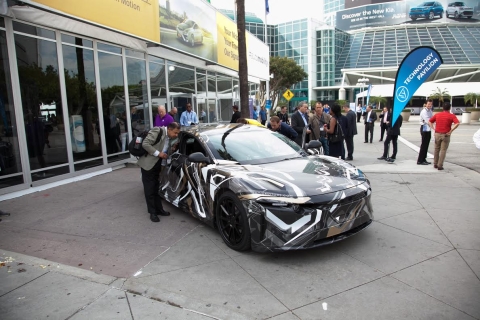LA Auto Show Hits ‘Refresh’ Button with Huge Success

A few years ago, the 110-year-old Los Angeles Auto Show was at a crossroads: it could either keep having the same show it had been holding for a long, long time – or, in a sector that was in desperate need of a change, it could take a chance and switch things up.
Fortunately, the show chose option No. 2, and after bringing on new management in 2012, it has taken big steps since to offer a more dynamic experience to the hundreds of thousands of visitors who attend each year.
The show’s executive vice president and general manager, Terri Toennies, said of the initial step that was taken, “The LA Auto Show decided to outsource and look for a new general manager for the show. The previous manager had been there for 30 years.”
Toennies, who has a background in hotels, special event venues and the House of Blues, came on board along with Lisa Kaz, the show’s president and CEO, and they both started looking at ways to ‘disrupt’ the show.
“For 14 days (at the show), every day is like running a concert event really,” Toennies said.
Attendees are coming to the event expecting to not only see the latest and greatest models of cars, but also they want to be wowed by ‘new’ technology and trends.
As a result, Toennies said, they decided to launch the Connected Car Expo in 2013 to tie in the world of the Internet of Things.
“We had a lot of tech exhibitors mixed with automobile manufacturers,” she added.
The Connected Car Expo evolved into AutoMobility LA, which now includes big-name speakers from companies like Intel, as well as a conference and a technology pavilion.
“The attendance has almost doubled since 2012,” Toennies said as a result of the changes made. “We took something that was on the horizon, and it continues to grow.”
The 2016 LA Auto Show press and trade days, now called AutoMobility LA, drew nearly 25,000 industry professionals and media correspondents, not only from the traditional auto show crowd, but also from a whole new variety of major tech companies, news outlets and startups, such as Facebook, Intel, PolySync and others.
From 3D-printed cars to virtual reality simulators, AutoMobility LA proved to be far different from the traditional auto shows many were used to and a trendsetter in the industry.
Any time a show, especially one with a deep history like theirs, decides to do things differently, it’s important to have all the key stakeholders on board.
“They are your platform, and their buy in is important,” Toennies said. Fortunately, brands jumped at the idea and ones like Ford embraced it wholly, even holding a hackathon at the 2014 show challenging people to come up with new technology for their cars.
Adding the technology component to the show, she added, also brought it a whole new energy that included attendees and media that had never been to it before.
“Whatever we are doing is working because we are bringing in a new audience,” Toennies said. Especially, she added, the coveted 18-35 age group.
The auto brands have upped the ante as well, creating more experiential marketing in their booths.
“It’s not just a consumer show, but more of a festival feel,” Toennies said. “In California, car culture is so big.”
The show also has a very collaborative relationship with the companies that exhibit at the show.
“We have 2-3 face-to-face meetings with them a year,” Toennies said. “We ask them what they like or don’t like. They bring their own ideas to the table and what they think could be brought to the show.”
The changes to the show have been worth it, with overall feedback ‘positive,’ according to Toennies.
“We are making people understand that a family of four can come and spend a really long time enjoying the show,” she added.


Add new comment